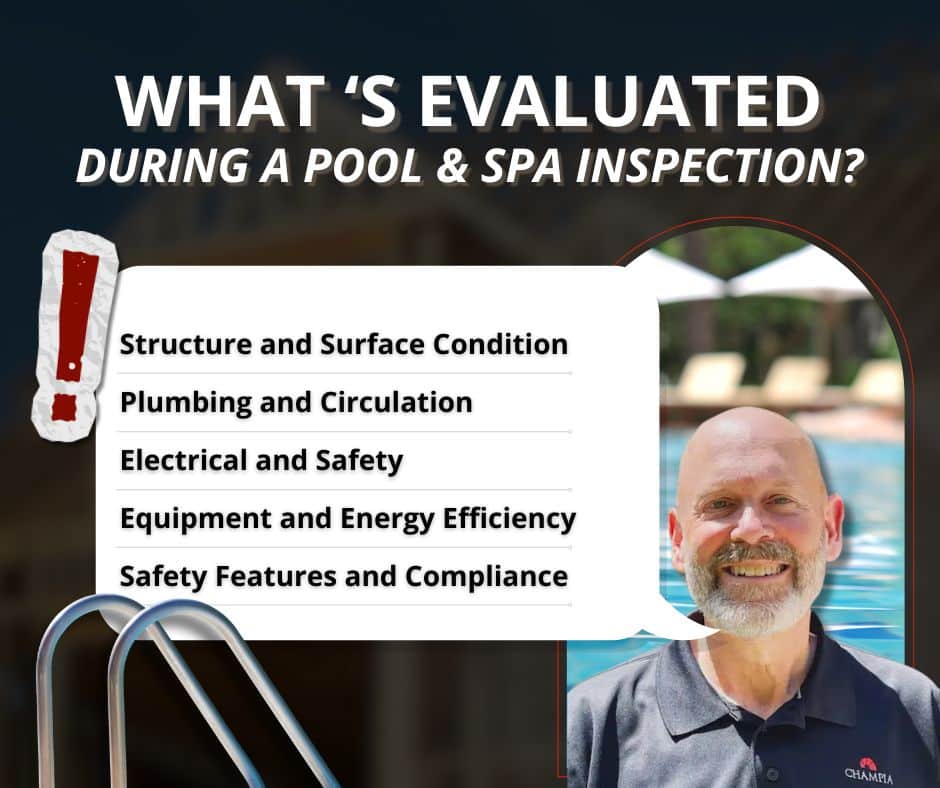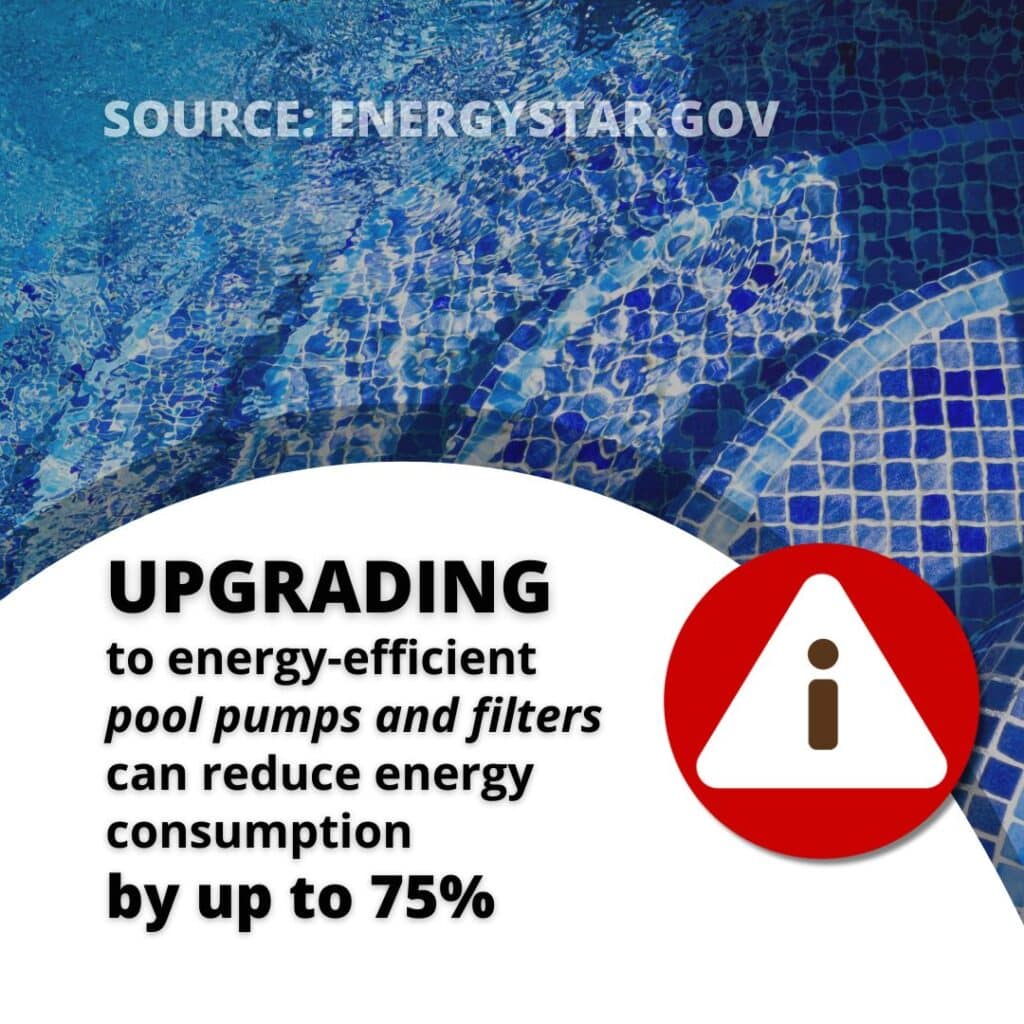A pool or spa can turn a house into a retreat, but only when it’s properly maintained and safe. Whether you’re buying a home with a pool or keeping up with one you already own, a professional inspection helps you catch issues early, prevent costly repairs, and ensure your system meets safety standards.
Pools look simple from the surface, but underneath are systems for plumbing, electrical, heating, and structure that need expert evaluation. In Georgia, heat and humidity wear down pool materials over time.
In Michigan, freezing temperatures and soil movement can cause hidden leaks and cracks. This guide explains what to expect during a pool and spa inspection and why it’s an essential step for protecting your property and family.
Why Pool & Spa Inspections Matter
A pool inspection is a detailed evaluation of how safely and efficiently your pool or spa operates.
For homebuyers, it can reveal hidden problems before you close on a property. For homeowners, it provides confidence that your pool’s systems are functioning correctly and that small maintenance issues aren’t about to become expensive repairs.
A neglected pool can waste thousands of gallons of water per season and drive up energy use by 30%. Regular inspections reduce waste, improve efficiency, and help avoid unnecessary strain on pumps, heaters, and filtration systems.
When Do You Schedule One?
Pool and spa inspections are most important at two key times: before purchasing a home and before opening your pool for the season.
You should also consider scheduling one if you notice:
- Cloudy or green water that won’t clear up
- Cracks or chips in the pool’s surface or deck
- Water loss is faster than normal evaporation
- Unusual sounds from the pump or heater
- GFCI outlets tripping near the pool area
In Georgia, most homeowners schedule pool inspections in early spring before swim season begins. In Michigan, it’s best to inspect in late spring after the last freeze so that any winter-related damage is visible.

What Inspectors Evaluate During a Pool Inspection
A professional pool inspection covers everything from structure to electrical systems. It identifies both safety concerns and long-term wear.
Pool Structure and Surface Condition
The inspector begins by assessing the pool’s overall structure, checking for cracks, stains, or separation between the deck and coping. For concrete pools, even small cracks can indicate leaks or pressure buildup. Vinyl and fiberglass pools are examined for warping or liner damage.
Common structure issues include:
- Cracked plaster or deteriorating tile
- Settling or gaps around the pool deck
- Signs of leaking through return lines or fittings
- Discoloration or staining from a chemical imbalance
Small surface defects can grow over time, especially in climates where temperature changes cause expansion and contraction.
Plumbing and Circulation Systems
Your pool’s plumbing keeps the water clean and moving. Inspectors check for leaks, correct flow rates, and balance pressure across all suction and return lines.
Areas evaluated include:
- Pump and filter function
- Skimmers and returns
- Valves, seals, and unions
- Drain covers for compliance and safety
Even minor plumbing leaks can waste significant water and chemicals. The EPA reports that a single leak dripping once per second wastes over 3,000 gallons per year. In pool systems that operate daily, those numbers climb fast.
Electrical and Safety Systems
Electrical safety is a top priority during every pool inspection. Faulty or outdated wiring poses serious hazards.
Inspectors confirm that all outlets, pumps, and lighting are grounded and bonded correctly. They also test GFCI protection, ensuring the system will shut off automatically in case of a fault.
Other electrical items checked:
- Pool lights and transformers
- Bonding of all metallic components
- Control panels and timers
- Automation systems or smart controls
The National Electrical Code requires that all pools and spas have properly bonded and grounded equipment to prevent electrical shock. A professional inspection ensures your setup meets these national safety standards.
Mechanical Equipment and Energy Efficiency
A pool’s equipment is its heart. The inspector tests each major component to ensure it’s performing efficiently and without leaks.
Key equipment inspected includes:
- Circulation pumps and filters
- Heaters, chillers, and thermostats
- Salt or chlorine generation systems
- Automatic cleaners and valves
- Water features or jets
Upgrading to energy-efficient pool pumps and filters can reduce energy consumption by up to 75%. During an inspection, your inspector may recommend adjustments or equipment updates to improve performance and reduce operational costs.
Safety Features and Compliance
Safety standards vary by region, but they’re a vital part of every pool inspection. Inspectors check compliance with state and local barrier requirements, ensuring the area around your pool protects children and pets.
Typical safety items reviewed include:
- Secure self-closing and self-latching gates
- Fence height and gap spacing
- Anti-entrapment drain covers that meet the Virginia Graeme Baker Pool & Spa Safety Act
- Pool alarms, motion detectors, or safety covers
- Slip-resistant deck surfaces
A compliant and well-maintained pool environment dramatically reduces the risk of drowning, which is a major safety concern for children under the age of four.
How a Pool Inspection Complements a Home Inspection
Many homeowners are surprised to learn that a standard home inspection doesn’t automatically include the pool or spa. These systems require specialized equipment and training.
A professional pool inspection works alongside a home inspection to provide a complete picture of your property. Since pools often connect to household plumbing and electrical systems, both inspections together ensure that no potential hazards or inefficiencies are overlooked.
For real estate agents and sellers, providing a current pool inspection report can strengthen buyer confidence and help avoid negotiation delays. For buyers, it ensures no surprise repairs appear after closing.
How Do You Prepare for a Pool or Spa Inspection?
A little preparation helps inspectors complete a more accurate evaluation.
Before the inspection:
- Remove debris and leaves from the pool and skimmer baskets
- Make sure the pool’s power supply is on
- Provide access to locked gates or enclosures
- Gather any maintenance or warranty records for reference
If your pool is closed for the season, communicate with your inspector about the best time for testing. Some evaluations, like water circulation and heating checks, can only be done when the system is running.

Common Issues Found During Pool Inspections
Even well-maintained pools develop small issues over time. An inspection helps you stay ahead of them before they worsen.
Frequent findings include:
- Clogged or aging filters are reducing the flow rate
- Leaky fittings or seals around valves
- Inconsistent water chemistry affecting surfaces
- Cracked or missing tiles and coping
- Malfunctioning GFCI outlets or lighting
- Signs of corrosion near metallic fixtures
Most of these problems can be repaired quickly once identified. Catching them early prevents water waste, chemical imbalance, or electrical hazards.
Regional Considerations
Pool conditions vary widely between climates, which is why inspectors adjust their approach based on the region.
- High heat and humidity increase algae growth and chemical usage.
- UV exposure and warm temperatures shorten equipment life.
- Frequent storms mean drainage and power systems must be inspected often.
- Winter freezing and thawing can cause cracks or expansion damage.
- Ice pressure can stress tiles, skimmers, and plumbing joints.
- Inspections after winter help identify frost heave or leaks before summer.
Inspectors familiar with both regions know what seasonal factors to look for and can help homeowners prevent weather-related damage.
When to Call a Professional
If your pool shows signs of water loss, poor circulation, or electrical issues, schedule a professional pool inspection immediately.
A certified inspector will test your system’s function, safety features, and compliance with local regulations. Afterward, you’ll receive a detailed report outlining all findings and recommendations for maintenance or repair.
Champia Real Estate Inspections offers pool and spa inspections as part of our full-service home inspection process, giving homeowners and buyers one comprehensive evaluation.
Other Questions Homeowners Ask
Do inspectors test the water quality?
Yes, most pool inspections include a basic water chemistry check for pH, sanitizer levels, and alkalinity. Balanced water helps protect both swimmers and pool surfaces.
How often should a pool or spa be inspected?
At least once a year, ideally before the main swimming season begins. Regular inspections help identify equipment wear, electrical issues, and leaks before they worsen.
What if I’m buying a home during winter?
Your inspector can still evaluate visible components such as structure, safety barriers, and equipment condition. Once the pool is reopened, a follow-up inspection can complete the process.
Conclusion
Owning a pool or spa adds enjoyment and value to your home, but it also comes with responsibility. A professional pool inspection ensures that your system is safe, efficient, and ready for use in any season. From electrical safety to leak detection, each detail matters in protecting your investment.
Whether you’re a buyer wanting to understand a property’s full condition or a homeowner preparing for the next swim season, schedule an inspection with Champia Real Estate Inspections.
Serving Georgia and Michigan, our certified team provides the expertise and attention to detail that help you enjoy your backyard retreat with confidence.
